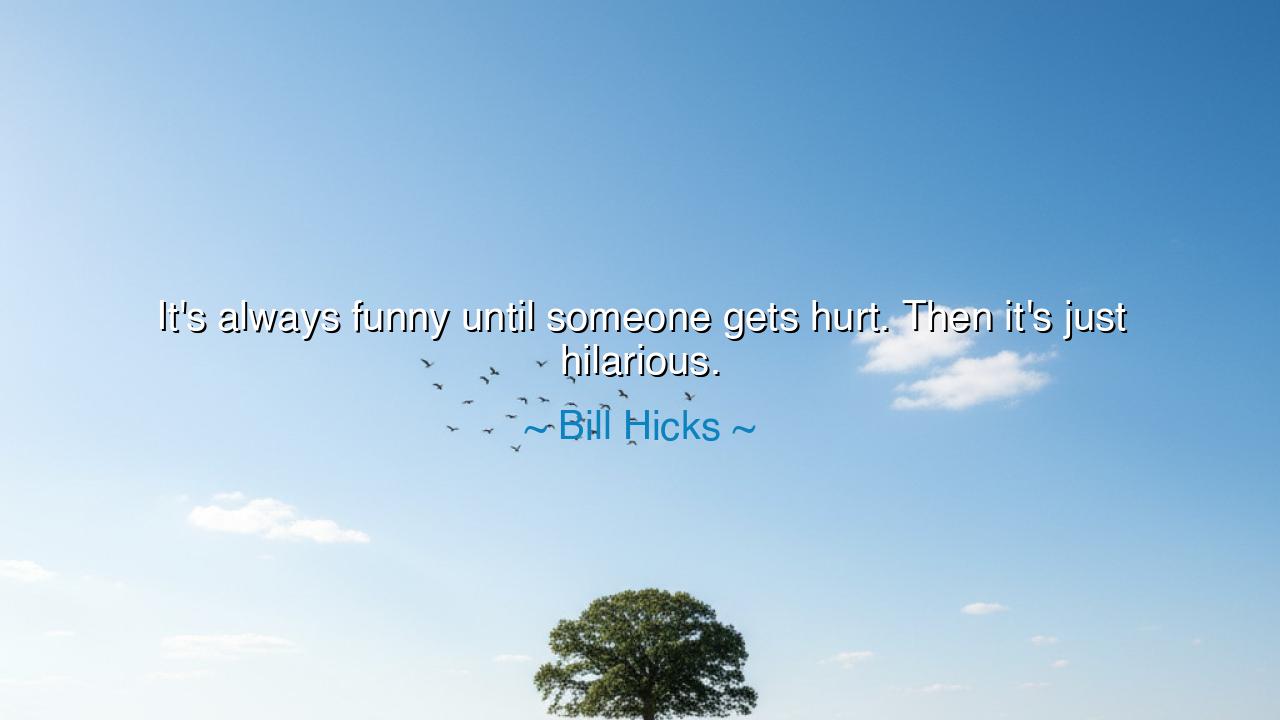
It's always funny until someone gets hurt. Then it's just






“It’s always funny until someone gets hurt. Then it’s just hilarious.” — Bill Hicks
In this darkly gleaming statement, the prophet-comedian Bill Hicks reveals a truth both unsettling and ancient: that laughter and pain are not opposites, but intertwined forces in the human soul. At first glance, the words seem cruel — how could harm deepen amusement? Yet beneath the jest lies a reflection of life’s strange duality. Hicks, a man who wielded comedy like a sword of truth, saw the world not in black and white, but in paradoxes. To him, comedy was not mere play — it was revelation, the mirror of our contradictions. The laughter that follows pain, he suggests, is not mockery but recognition — an admission that life’s tragedies are so absurd that only laughter can contain them.
The ancients understood this same paradox. The Greeks, in their theatres of marble and flame, gave birth to tragedy and comedy as twins, not rivals. They knew that to laugh at misfortune was to face the truth without flinching. Aristophanes, the great comic playwright, mocked generals and gods alike, turning even the sacred into jest. His laughter was not cruelty — it was courage. To laugh when someone gets hurt is to acknowledge what we all fear: that pain is universal, inevitable, and woven into the fabric of existence. Thus, when Hicks declares it “hilarious,” he is not celebrating suffering, but our strange, desperate ability to find light in its shadow.
Consider the battlefield — the crucible of both horror and humor. Soldiers through the ages have told jokes amid death, not because they were heartless, but because laughter was their last defense against despair. In the trenches of World War I, amidst mud and madness, men carved smiles into the face of misery. They laughed when shells fell too close, when rations froze, when hope seemed lost. Their laughter was rebellion — a declaration that even in ruin, the human spirit would not kneel. This is the deeper meaning of Hicks’s words: that when life wounds us, the act of laughing at the wound becomes an act of power. The pain cannot own us if we can mock it.
Hicks himself was no stranger to pain. He was a truth-teller in a world that feared honesty. Through his sharp wit, he confronted hypocrisy, greed, and mortality — and often, he paid the price. When he said, “It’s just hilarious,” he was laughing at the absurdity of existence, at how mankind dances on the edge of self-destruction yet calls it progress. His humor was forged in the fires of awareness. Like the jesters of old who told truth to kings, Hicks used humor as armor and irony as illumination. He knew that only through laughter could one look upon the chaos of the world and remain sane.
There is also, in his words, a warning. Humanity delights in spectacle — we laugh at the missteps of others, at the fool’s fall, the rival’s ruin. But often that laughter conceals fear. We laugh not because we are cruel, but because we are afraid it could be us next. The ancients would have called this the laughter of the gods — the laughter that rises when fate reminds mortals of their frailty. In it lies both truth and danger: truth, because it reveals our shared vulnerability; danger, because it tempts us to grow callous. Thus, “hilarious” becomes not only a description of the absurd, but a mirror of the soul — how far we will go to escape our own terror by turning it into jest.
The lesson, then, is not to glorify cruelty, but to transform pain through laughter. When someone falls, we may laugh — not out of malice, but out of recognition. For we, too, have fallen, and will fall again. Humor becomes the bridge that joins suffering and understanding. To laugh at the absurdity of life is to humble oneself before it, to say, “I see the madness, and still, I stand.” The wise do not avoid laughter in times of pain — they use it to rise above the wound. As the Stoics taught: if you cannot change fate, you may as well smile at its irony.
So, my child, when the world bruises you — laugh. When your plans collapse, when life betrays its promises, when others wound you with their words — laugh, not to deny the pain, but to claim mastery over it. Let your laughter be sacred, not cruel; fierce, not hollow. Laugh not at others’ suffering, but at the great cosmic joke that we all share this fragile, fleeting stage together. In laughter, you will find strength. In irony, you will find wisdom. And when the curtain falls, you may look upon the chaos of life, smile, and whisper with Bill Hicks and all the ancient sages:
“It’s always funny until someone gets hurt. Then it’s just hilarious.”






AAdministratorAdministrator
Welcome, honored guests. Please leave a comment, we will respond soon